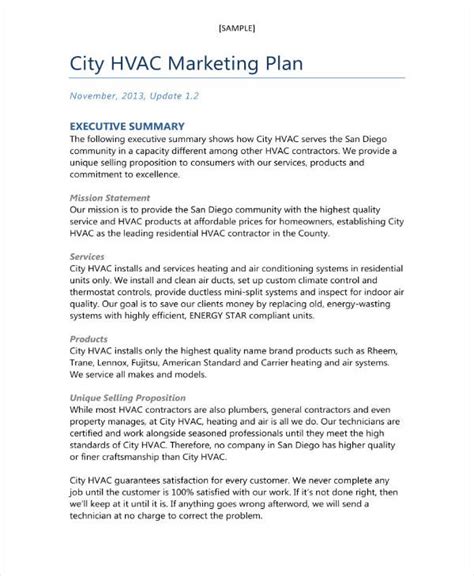Hvac Business Plan

In the bustling world of modern construction and facility management, HVAC (Heating, Ventilation, and Air Conditioning) systems are an indispensable part of our daily lives. These systems ensure our comfort and well-being, especially in extreme weather conditions, by regulating indoor temperatures and maintaining optimal air quality. The industry is experiencing rapid growth, and with advancements in technology, there is an increasing demand for efficient and sustainable HVAC solutions. This article delves into the intricacies of starting and successfully operating an HVAC business, offering expert insights and a comprehensive plan for those venturing into this vital industry.
Understanding the HVAC Industry

The HVAC industry is a complex and ever-evolving field, playing a crucial role in various sectors, including residential, commercial, and industrial spaces. With a focus on comfort, health, and energy efficiency, it is an industry that demands a high level of technical expertise and a commitment to continuous learning. Understanding the dynamics of this industry is the first step towards building a successful HVAC business.
Market Analysis
The market for HVAC services is vast and diverse, with opportunities ranging from residential AC installations to complex commercial HVAC systems. A thorough market analysis is essential to identify target segments, understand customer needs, and stay ahead of the competition. Key factors to consider include:
- Demographic trends and population growth in your target area.
- Economic conditions and their impact on the construction and renovation sectors.
- Seasonal variations in demand and how to optimize your services accordingly.
- Emerging technologies and their potential to disrupt the industry.
Industry Trends
Staying abreast of industry trends is crucial for any HVAC business. Some key trends shaping the industry include:
- Sustainability and Energy Efficiency: With increasing environmental concerns, there is a growing demand for green HVAC solutions. This includes energy-efficient systems, renewable energy integration, and sustainable design practices.
- Smart Technology: The integration of smart technology into HVAC systems is revolutionizing the industry. From remote control and monitoring to predictive maintenance, smart HVAC offers enhanced efficiency and convenience.
- Indoor Air Quality: With rising health consciousness, indoor air quality has become a top priority. Advanced filtration systems, humidity control, and air purification technologies are gaining prominence.
Developing a Comprehensive Business Plan

A well-crafted business plan is the backbone of any successful enterprise, and for an HVAC business, it is crucial to cover all aspects, from operations to marketing strategies. Here’s a detailed guide to crafting an effective business plan.
Executive Summary
The executive summary provides an overview of your business, its unique value proposition, and its long-term goals. It should be concise yet informative, highlighting the key strengths and potential of your HVAC business. Include a brief introduction to the founders, their industry experience, and the company’s mission and vision.
Company Description
Here, you delve into the specifics of your HVAC business. Describe the services you offer, the target market, and the unique selling points that set your business apart. Detail your commitment to quality, customer satisfaction, and continuous improvement. Include any partnerships, certifications, or affiliations that enhance your credibility.
Market Analysis and Strategy
Building on your initial market analysis, this section should provide a detailed understanding of your target market and your strategy to penetrate it effectively. Identify your target customers, analyze their needs, and develop tailored solutions to address those needs. Detail your marketing and sales strategies, including any unique approaches you plan to implement.
Service Offerings
Clearly outline the services your HVAC business will provide. This may include installation, maintenance, repair, and upgrade services for residential, commercial, and industrial HVAC systems. Highlight any specialized services, such as energy audits, smart HVAC system integration, or green HVAC solutions. Provide an overview of the equipment and tools you will use, ensuring they are of the highest quality and meet industry standards.
Operational Plan
An efficient operational plan is crucial for the smooth running of your HVAC business. Detail your hiring and training processes, ensuring that your team is skilled, knowledgeable, and customer-centric. Outline your equipment maintenance and procurement strategies, as well as your plans for managing inventory and ensuring prompt delivery of services.
Financial Projections
Provide a comprehensive financial overview, including startup costs, operational expenses, and projected revenue. Detail your pricing strategy, considering market rates, cost of operations, and the value you bring to customers. Include a breakdown of your expected expenses, such as labor, equipment, marketing, and overhead costs. Create realistic financial projections for the next 3-5 years, including cash flow statements and balance sheets.
Marketing and Sales Strategy
Developing an effective marketing and sales strategy is crucial for the success of your HVAC business. Identify your target audience, their pain points, and how your services can address their needs. Leverage digital marketing, social media, and SEO to reach a wider audience. Consider offering promotions and discounts to attract new customers and build brand loyalty. Implement a referral program to encourage word-of-mouth marketing.
Competition and Growth
Analyze your competitors, their strengths, weaknesses, and market share. Identify gaps in the market that your business can fill. Detail your plans for growth, including expansion into new markets, introduction of new services, and continuous improvement of existing offerings. Emphasize your commitment to staying ahead of industry trends and meeting customer expectations.
Implementing and Managing Your HVAC Business
With a solid business plan in place, the next step is to bring your HVAC business to life and ensure its successful operation. Here’s a guide to the key aspects of implementation and management.
Starting Up
Starting an HVAC business involves several critical steps. These include registering your business, obtaining the necessary licenses and permits, and setting up your business location. You’ll also need to acquire the necessary tools, equipment, and vehicles for your operations. Develop a comprehensive employee handbook to outline your company policies, procedures, and expectations.
Staffing and Training
Hiring the right team is essential for the success of your HVAC business. Look for skilled, experienced technicians who are committed to continuous learning and customer satisfaction. Implement a robust training program to ensure your team stays updated with the latest industry trends and technologies. Offer regular workshops and seminars to enhance their skills and knowledge.
Customer Service and Satisfaction
Customer satisfaction should be at the heart of your HVAC business. Develop a customer-centric culture, ensuring that your team is friendly, responsive, and solution-oriented. Offer prompt and efficient services, and go the extra mile to exceed customer expectations. Implement a feedback system to continuously improve your services based on customer feedback.
Marketing and Branding
Effective marketing is key to the success of your HVAC business. Develop a strong brand identity that reflects the quality and reliability of your services. Leverage digital marketing, social media, and SEO to reach your target audience. Offer valuable content, such as blog posts and videos, to establish your business as a trusted source of information in the HVAC industry.
Financial Management
Efficient financial management is crucial for the long-term success of your HVAC business. Implement a robust accounting system to track income, expenses, and cash flow. Develop financial controls to ensure accuracy and transparency in your financial records. Regularly review your financial statements to identify areas for improvement and make informed business decisions.
Business Growth and Expansion
As your HVAC business grows, it’s important to have a clear strategy for expansion. Consider diversifying your services, targeting new markets, or acquiring additional resources. Continuously monitor industry trends and customer feedback to identify new opportunities for growth. Stay agile and adaptable to changing market conditions and customer needs.
Future Outlook and Sustainability
The future of the HVAC industry looks promising, with increasing demand for energy-efficient, sustainable solutions. To stay ahead, it’s crucial to embrace technological advancements and adapt to changing market dynamics. Here’s a look at the future of the HVAC industry and strategies for long-term sustainability.
Embracing Technology
Technology is transforming the HVAC industry, offering enhanced efficiency, convenience, and sustainability. Stay updated with the latest advancements, such as smart HVAC systems, renewable energy integration, and advanced air purification technologies. Invest in training your team to use and maintain these technologies effectively.
Sustainable Practices
With growing environmental concerns, sustainable practices are becoming a priority for HVAC businesses. Implement green initiatives, such as using energy-efficient equipment, reducing waste, and promoting sustainable design practices. Offer energy audits and green HVAC solutions to help customers reduce their carbon footprint.
Continuous Learning and Adaptation
The HVAC industry is constantly evolving, and staying ahead requires a commitment to continuous learning and adaptation. Stay updated with industry news, attend conferences and workshops, and encourage your team to do the same. Embrace change and be open to new ideas and technologies. Adapt your business strategies to stay relevant and meet the evolving needs of your customers.
Building a Strong Reputation
A strong reputation is invaluable for any business, and in the HVAC industry, it’s a key differentiator. Deliver exceptional service, maintain high standards of quality, and ensure customer satisfaction. Encourage customer feedback and use it to continuously improve your services. Build relationships with industry influencers and thought leaders to enhance your credibility and reach.
Long-Term Sustainability
To ensure the long-term sustainability of your HVAC business, focus on building a resilient and adaptable business model. Stay financially disciplined, manage your cash flow effectively, and invest in your team’s growth and development. Embrace diversity and inclusion, creating a workplace where everyone can thrive. Continuously seek feedback from your team, customers, and industry peers to identify areas for improvement and stay ahead of the competition.
Conclusion

Starting and operating an HVAC business is a challenging yet rewarding endeavor. With a solid understanding of the industry, a well-crafted business plan, and a commitment to excellence, you can build a successful and sustainable HVAC enterprise. Embrace change, stay customer-centric, and continuously strive for improvement, and your HVAC business will thrive in the years to come.
What are the key certifications required to operate an HVAC business?
+To operate an HVAC business, you typically need certifications in HVAC installation and repair, such as the HVAC Excellence Certification or the NATE (North American Technician Excellence) Certification. These certifications ensure that your technicians have the necessary skills and knowledge to provide high-quality services.
How can I differentiate my HVAC business from competitors?
+To stand out, focus on delivering exceptional customer service, offering specialized services like smart HVAC system integration or green HVAC solutions, and embracing technology for enhanced efficiency and convenience.
What are the key financial considerations for starting an HVAC business?
+Financial considerations include startup costs for equipment, vehicles, and business registration, as well as ongoing expenses for marketing, staffing, and overhead. It’s crucial to have a solid financial plan and manage your cash flow effectively.



